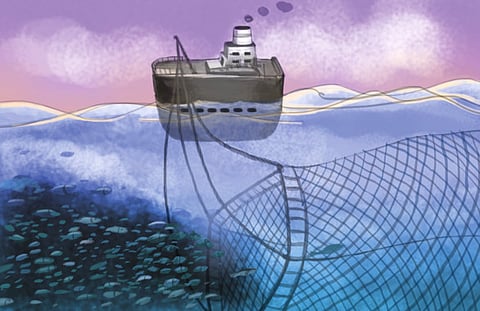Focus: Overfishing
Gulf News readers address the global decrease in fish population

FISH POPULATION
We are encroaching breeding grounds
Diminishing fish populations is a huge and complex topic. It is very interesting here on the western coast of Canada. Fishing is largely sustainable because there is such an abundance, however much of the sustainable local catch is hugely expensive because it is in high demand in overseas markets.
One issue I am interested in is the population of salmon that the resident Orca whale populations depend on. It is all they will eat! From what I have observed, shortages of salmon are caused mainly by habitat destruction more than over-fishing, due to encroaching on spawning streams. One of the ships I manage is a large fisheries research trawler that the scientists use, to gauge fish populations and whether they are in good health. Based on that, we are able to determine when the fishing season can open and close. Fisheries science is another very complicated matter and it tends to be a sore spot and can get very political here very quickly. We experienced that with the herring fishery here last fall, which got quite ugly. One group of people wanted to conserve fish, while another wanted to open a commercial herring fishery. The point is that there are many factors that influence fish populations. Too many predators and encroaching on breeding grounds being two equally large problems to address.
From Mr E. Robinson
Shipping operations manager based in Canada
EATING RIGHT
Be vegetarian, as an option
Over-fishing is an unsustainable practice that is reducing the breeding stock to dangerously low levels, possibly resulting in extinction. However, there are sustainable fishing practices as well. Having said that, as a health coach, I do not recommend one stops eating fish altogether. Everyone’s dietary needs and lifestyle is unique. Undoubtedly, fish is one of the best low calorie, high protein foods. It is rich in most nutrients the population lacks in general. It is called ‘brain food’ due to high levels of Omega 3 fatty acids found in fish oil. Fortunately, if you’re not a fish lover, or you are vegetarian or choose not to consume fish due to environmental reasons, there are a large number of options out there. Try tofu, tempeh, seaweed, flax seeds, chia seeds, walnuts, spinach/kale/leafy greens, Algae Omega 3 supplements. These are all good sources of Omega 3 fatty acids. For your protein intake, peas, quinoa, nuts and nut butters, beans, chickpeas, hemp, sesame/sunflower/popeye seeds, and again tempeh, tofu, chia seeds are all rich sources. Depending on one’s individual needs, it is not difficult to omit fish completely and reach dietary requirements by vegetarian means alone.
NUTRITIONAL VALUE
From Dr. Youssef Al Saadi
Food scientist and biologist based in UAE
OCEAN FRIENDLY
Sustainable fishing for the future
We have lived in a bubble so far. Humans have often wrongly believed that the sea has an inexhaustible supply of fish. The UAE in particular has a large appetite for fish, with many species being taken out well beyond sustainable levels. Eating abundant local species would be the most environmentally considerate way to consume fish. Agreed that certain types of fish are chosen over others for their superiority in dietary value, but overfishing and pushing them to the brink of extinction is not the right answer. There is no point in overfishing and being misguided to believe a temporary abundance of fish is high in nutritional value if that would lead to a sudden depletion of this particular fish species altogether. This would only leave consumers with no choice but to eat fish with a lower dietary value. However, if the imbalance is recognised and corrected before the extinction takes place, there would be no need to overfish them at all. Let’s take blue fin tuna as an example. Blue fin tuna is highly endangered, on the brink of extinction; there are better alternatives, such as the yellow fin tuna, which could be eaten instead.
By choosing to eat sustainable fish, we can lower the demand for overfished species. That would help us to rebuild and safeguard species that are currently suffering unnatural levels of endangerment. If these fish are sustainably fished to begin with, a lot of environmental catastrophes can be prevented, along with the benefit of a higher consumer satisfaction in the long run. The greatest threat to our planet is our belief that someone else will come along and save it. Each individual must take a step or make an educated decision, and it begins with consuming sustainable fish.
INDIVIDUAL ACTION
Reverse the damage, be cognisant
Student based in Gothenburg, Sweden
Sign up for the Daily Briefing
Get the latest news and updates straight to your inbox


